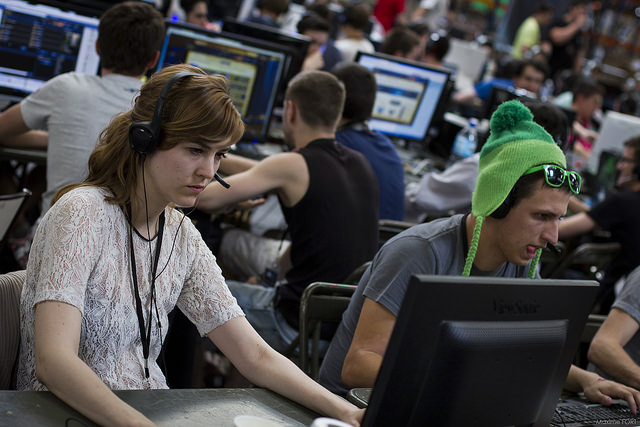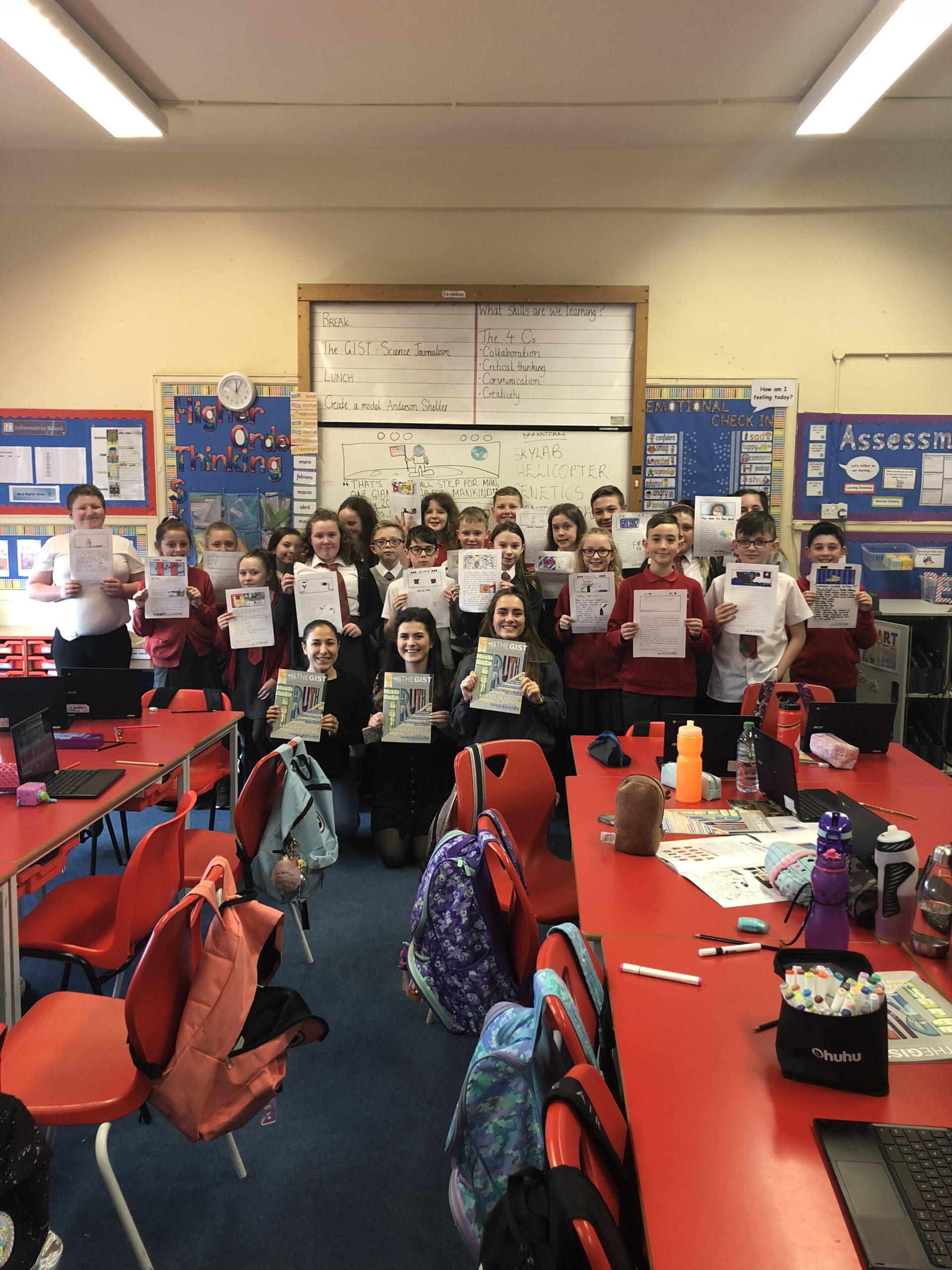Can we use online games as educational tools?

On the 3rd of August this year KeyArena Center in Seattle was flooded with people eagerly awaiting to see their favourite teams play. But they were not there to watch the stars of NBA or the next edition of the Super Bowl, instead the reason for their excitement was The International 2015, an electronic sports Dota 2 championship tournament. The competition was impressive, not only because of the vast number of visitors but also because of the impressive prize pool of over $18 million. Esports are organised multiplayer video game competitions between professional players. They include game genres such as real-time strategy, fighting, first-person shooter, and multiplayer online battle arena. In 2013, figures showed that approximately 71 million people worldwide watched competitive gaming 1. Since online games have attracted the attention of so many people, can we use them not only as entertainment but as educational tools as well?
What are MMOGs and who plays them?
Massively multiplayer online games, or MMOGs, are games in which players can interact with one another to explore environments and fight ferocious computer-generated enemies or even other players. At the same time they have to develop the strengths and abilities of their in-game character. Some people have in their heads the image of a young, socially awkward male when they hear the term ‘online video games’, but studies show that this is largely a misconception. The latest report from the Entertainment Software Association reveals that the average age of videogame players is 35 and 44% of them are women 2.

Not all gamers fit the stereotype of a young male. Image credit: Maxime FORT via Flickr CC BY-ND 2.0 license
One of the most important components of these games is the social aspect. If players want to participate in communities, and complete the most difficult challenges that these games offer, they need to show positive social skills such as being friendly and helping one another. Just like in the real world, anti-social behaviour towards others can have detrimental consequences for the player. Those who do not put effort into developing their social competence will not be welcomed into groups and will be reported to others as a bad example, resulting in virtual ostracisation. It is not uncommon for players who want to join particular teams to fill in application forms and be interviewed by group leaders, much like for a real-life job. The structure of the teams is the same as that of real-world organisations where a chosen leader distributes tasks to individual members and the team works together to achieve an assigned goal 3.
MMOGs as learning environments
Based on such games, scientists and educators have developed massively multi-student online learning environments, pedagogically designed spaces where students can learn online by completing tasks and interacting with others. Since the current teaching environment, in which students learn in a classroom with a teacher, is mostly content-oriented and centered around the educator, too much importance is given to memorising facts out of context and preparing for exams. Thus when students are faced with a problem presented in a slightly different way, they find it problematic to come up with a solution. This is why they should be encouraged to develop better thinking and problem-solving skills, which can only happen through active participation 4. This is where we can utilize online games. When interacting with virtual environments students leave behind their passive role in the education process and can have fun while asking questions, socialising, and solving problems. They can take risks and explore at their own pace without any major consequences 5.
Educational games encourage developing strategies, testing hypotheses, and higher order thinking rather than simple comprehension. They have rules, goals, outcomes, feedback, and require socializing 6. Online games make the students decision-makers and allow them to learn through trial and error, receiving immediate feedback for their actions. In games like World of Warcraft (WoW), a popular MMOG, you need to develop genuine expertise since players are part of a team in which every player has a different and essential role. In order to win a battle, you need to understand other players’ in-game abilities as well as your own. Online games are fun and engaging, and the skills involved can be applied to a wide variety of topics including geography, engineering, and military training 7.
Games also lead to unintentional learning. For instance, in WoW, players can take up a profession like blacksmithing, which involves becoming familiar with the necessary tools and metals. While interviewing two gamers in their research, Jane Barnett et al. found that they have developed a basic understanding of metallurgy from their time spent online. On a science test at school the gamers had no trouble coming up with the two substances that make bronze, something which no one else in their class knew 8 .
The case studies
In 2007, Foreman and Borkman used The Sims Online to conduct learning exercises in their sociology class. Through structured interactions in a set of simulated scenarios, their students could develop an understanding of sociological principles. The students showed high levels of analytical and interpretative abilities, and had little difficulty recognising sociological concepts when they appeared in the game 9.
In a similar study, Dede et al. designed a game called River City, which teaches scientific enquiry skills to middle school students. The goal of the game is to find out why the residents of the city are getting ill. To do that the students worked in teams, exploring and analysing water-related health problems. The game provided them with the opportunity to become scientists and to use their knowledge in an applied context. Moreover, they enjoyed the mystery factor and the absence rates went down 10. The colourful design of the game served as an effective tool in capturing the children’s interest. Photos of the game’s interface can be found on Harvard’s original website about the project 11.
These promising studies show that massively multiplayer online games can be utilised as effective educational tools, if developed and applied properly, due to their wide-ranging student appeal. Despite the fact that they are entertaining, these games can not replace all aspects of the current education model. Instead they can be used as the basis of innovative homework assignments. Games like River City can improve the computer skills of students in a time when technology is widely used in many professions. It is not surprising that even large companies like IBM are starting to recognise the usefulness of gaming experience: ‘It’s not a stretch to think resumes that include detailed gaming experience will be landing on the desks of Fortune 500 executives in the very near future. Those hiring managers would do well to look closely at that experience, and not disregard it as mere hobby. After all, that gamer may just be your next CEO’ 12.
References
- Check it out here
- Read it here
- Barnett, J., & Coulson, M. (2010). Virtually Real: A Psychological Perspective on Massively Multiplayer Online Games. Review of General Psychology, 14, 2, 167–179
- Galarneau, L., & Zibit, M. (2007). Online Games for 21st Century Skills. In D. Gibson, C. Aldrich, & M. Prensky (Eds.), Games and Simulations in Online Learning: Research and Development Frameworks. (pp. 59-88). Hershey, PA: Information Science Publishing
- Gee, J. P. (2007). What video games have to teach us about learning and literacy. NewYork: Palgrave-McMillan
- Dondlinger, M. J. (2007). Educational video game design: A review of the literature. Journal of Applied Educational Technology, 4(1)
- De Freitas, S., & Griffiths, M. (2007). Online gaming as an educational tool in learning and training. British Journal of Educational Technology, 38(3), 535-537
- Barnett, J., Coulson, M., & Foreman, N. (2009). Testing the efficacy of the General Aggression Model: Exploring responses to provocations in non-gamers, and gamers after violent online play. Unpublished doctoral dissertation, Middlesex University, London, UK
- Foreman, J., & Borkman, T. (2007). Learning Sociology in a Massively Multistudent Online Learning Environment. In D. Gibson, C. Aldrich, & M. Prensky (Eds.), Games and Simulations in Online Learning: Research and Development Frameworks. (pp. 49-58). Hershey, PA: Information Science Publishing
- Read about it here
- Here!
- International Business Machines Corporation. (2007). Virtual worlds, real leaders: Online games put the future of business leadership on display (A Global Innovation Outlook 2.0 Report). Palo Alto, CA: Author











Hi Pamela – great article! I’m also a student with a keen interest in educational psychology, my colleague and I developed an app which applies these techniques into an intuitive platform students can engage with.
Please let me know if you’d be interested in writing some blog posts for our site as I think your writing style and research interests would align perfectly with what we’re doing!
James
Hello James,
can you tell me more about the project that you are working on? Sounds very interesting. 🙂
Poker is not a card game of chance rather it
is a game of efforts, intellect, deep understanding, calculating permutations and combinations, calculated
moves, knowing probabilities, bluffing and deceiving. This
is often literally a fairly easy move to make, notwithstanding such a
many people believe. constructed in China and Taiwan, some
from the worst of the perpetrators.
all games which are the latest versions of all games ever but some kids or peoples love to play their favorite game
One of the earliest games was the “Snake” which was launched in 1997. With the advent of sleeker platforms and consistent enhancements, the processing capabilities of today’s average mobile phone are much better than the processing capabilities of the costliest phone launched a decade back.
Thanks for sharing such useful information. I hope you will share more useful information in the future also.
thanks for sharing such a nice post
Google Analytics 360 is a super-charged version of the free product. Most companies start with the free version to simply
Thanks for sharing such a great information. It really helpful to me.